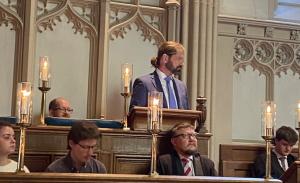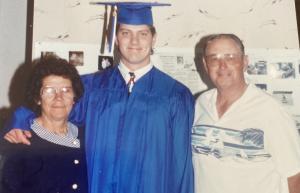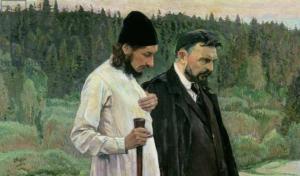
Texts:
- Genesis 24.1-27 – Abraham’s servant departing to find Rebekah at the well for Isaac
- Mark 5.21-43 – Jairus’ daughter, woman with hemorrhage
The aspect of theological language I think our readings point us to this evening is the faithfulness of God.
I want to suggest to you that the failure of our plans is not the failure of God’s faithfulness.
Abraham’s Gamble
First, Abraham, the great hero of faith for both Old and New testaments. Abraham who trusted in a promise even when he didn’t know the outcome. Who set out, as Hebrews tells us, not knowing where he was going” (11:8). God promised to bless the people that would be born of Abraham, but the journey was confusing to say the least. We’ve seen Abraham at wits end about when he will have a son, and then again when God commanded him to sacrifice his son. Now the chances of Isaac staying in the promised land and starting a family are looking grim. And that WAS the promise. Wasn’t it?
So Abraham makes a gamble, sending out his servant to go back to the land of Haran to find a wife for Isaac.
Over and over, Abraham has to ask “did I hear the promise right? Where is God taking me?” Again and again, he sets out, not knowing where he is going.
Let’s leave Abraham there in Canaan for the moment, awaiting news from his servant.
The Faith Taco
Jairus’s Extra
Mark’s gospel gives us the parallel stories of a sick child and a suffering woman. Not really parallel so much as a sandwich. Or, as I’m from Texas, a taco: the woman’s story is folded up in the tortilla of Jairus’s child.
Jairus is a synagogue official, desperately aware that he’s losing his daughter. He pleads earnestly—pollus, the Greek says: extra- with a surplus of passion and desperation.
Now, when we hear that, we may think that we’ve seen his faith. Earnestness looks like faith. Maybe faith is, if you’ll allow me to quote Linus from the Peanuts comic. “Nothing but sincerity as far as the eye can see.”
But that story has more to tell us. Jesus tells him “just have faith,” after this earnest plea,” as if we haven’t entirely seen faith from him yet. As if the extra sincere pleading were perhaps only a preamble, or a feature of believing, but not the essence of faith.
So what is the faith Jesus wants him to have?
The Hemorrhaging Woman’s Extra
Let’s look inside the taco:
A Galillean woman is also desperate for healing. She is losing her life, slowly, through a hemorrhaging that won’t stop. She has endured much, pollus, the same word. Extra. A surplus not of passionate appeal, this time, but of suffering. She comes to find healing in Jesus, But then sees him so completely mobbed that she can’t even get close. And he’s already walking away. There’s no indication of a precendent for garment grabbing in Mark—or any other gospel. It’s not a planned action. It seems like the sort of impromptu effort one might make when all other avenues close down.
The Extra of Faith
So it’s a third pollus, extra, that changes the story. He pleads extra. She has suffered extra. And now the Galilean woman does something extra.
She makes a grab, not so that she can have her hopes fulfilled, but precisely because it seems at that moment that her plans have failed. She came for healing, and he is walking away.
This, Jesus says, is what faith, trust, looks like.
Staying with God’s faithfulness, even when our plans fail.
“Only Have Faith”
Back to the folded tortilla. Jesus arrives at Jairus’s house to find the girl has died. Or at any rate the friends and family say she has died. “Do not fear,” Jesus tells the dean of the synagogue. “Only have faith.” Remember: Jairus did not come to Jesus for a resurrection. He came in hopes that Jesus could heal his sick child. That hope seems to have been dashed, because Jesus took his time—as he did also with his friend Lazarus. The confusion with the crowd and the woman distracted him just long enough to take the poor child past the point where a healer could help.
“Only have faith,” Jesus says.
As a friend of mine put it in song lyrics, “dreams and busses have a way of breaking down.”
This is what faith looks like: Trust when hope breaks down. Faith is not just extra sincere petitioning. And it’s not even a matter of extra suffering. It is to allow yourself to be persuaded that Jesus’ healing presence will not simply bring you what you were hoping for, but instead will show you your truest desires, for the first time. That’s the extra of faith.
Abraham and God’s Faithfulness
We’ve left Abraham waiting for his servant, haven’t we?
It’s easy to imagine Abraham as a kind of celebrity exhibit in a museum of faith. With a plaque that tells us all he believed. He heard a promise clearly, and then trusted that God would fulfill it. But that’s not how Genesis tells his story. Abraham consistently trusts in a promise that he can’t quite put into words, and so he doesn’t quite know what the fulfillment looks like. He’s learning what the word God means, and who his covenant partner YHWH is, step by step. Notice what Abraham says to his servant:
But if the woman is not willing to follow you, then you will be free from this oath of mine”
These three faithful responses are all just a little different, aren’t they? 3 different ways of responding to the dashing of plans. 3 different “extras,” pollus, moments with God beyond what it was they were imagining would happen next.
- The Galilean woman makes a desperate lunge at Jesus.
- Jairus follows in stunned silence.
- Abraham plans for the unplanned: I hope God will do it this way, but let’s be honest, it’s YHWH we’re talking about. There’s really no telling.
God’s Faithfulness and Us
Abraham, the father of our faith, assumes that if his hopes are broken, it’s not the end of God’s faithfulness. It means, rather, that the next thing God does will show Abraham a little more fully who his God is.
I wonder if you’ve ever been there: walking in all the light that you have, and then you realize that you have never really known where God is leading you.
The end of your plans, even your hope, may seem like the end of everything.
“Only have faith,” Jesus says. Not “believe harder, more sincerely.” Because faith isn’t measured by our sincerity.
The measure of faith is God’s own trustworthy character. God will never stop being worthy of our trust.
In the hardest moments, faith may not even feel like faith. It may simply be a decision to keep following. We wait, like Jairus, for what God will do next.
This is what faith looks like today in Ukraine. It’s also what faith looks like in a small Catholic town called Uvalde, TX, not far from where I live, which is still reeling from losing so many of its children to gun violence.
Why Faith is Difficult
The God we trust emerges slowly, only as we put one foot in front of the other, and allow ourselves to discover the new and surprising—and surprisingly difficult—ways that God is shaping us to trust him. I’ve referred to this before as the diagonal of faith. Only in stepping forward can I find myself advancing Godward. Each new step brings me into God’s presence in a way I never could have predicted.
This is maybe the central challenge, annoyance even, of faith: we can’t fully name the God we’re following, or the promise that God has given us, because we ourselves are in the middle of things. Jairus is prepared to trust that Jesus can heal his daughter, but then watches Jesus get distracted. The unnamed woman desires healing, but then Jesus passes her by surrounded by a crowd. Abraham sends his servant to Haran, but then admits that it may be all for nought.
Faith is the extra invitation to trust when we realize we have no idea where we are going, where God is taking us, or what God even meant by promising me a hope and a future.
Faith is the grab for Jesus’ robe even as he walks away with our hope.
Faith is trusting that the failure of my plan is not the failure of God’s faithfulness.
To have faith is to be the sort of person who waits for the faithfulness of God.
My hope for you on this summer evening is that you will experience God as one who comes near to you.
My hope is also, though, that when you experience God walking away, ignoring your plea, or bringing you to the end of your dreams, you will wait for the next thing God will do. I believe it will reveal to you the faithfulness of the gracious and trustworthy God you’re only beginning to know.
Evensong, June 19, 2022











